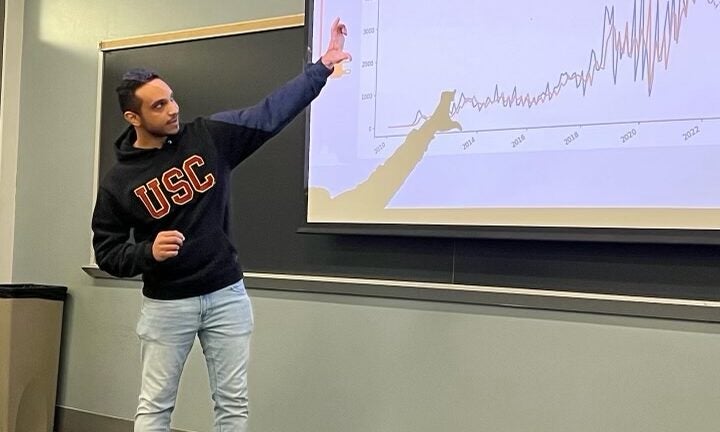The Master of Science in Applied Economics and Econometrics (MS AEE) provides students with rigorous training in mathematical and statistical modeling of data and economic policy analysis. The program allows students to take classes in Economics, Mathematics, Physics, Finance, Consulting as well as at the USC Viterbi School of Engineering, thereby enabling them to specialize their skills in the field of Financial Economics, Machine Learning, Quantitative Finance, Behavioral Economics and Global Policy Analysis.
Our graduates have been accepted at PhD programs at NYU, Duke, University of California Davis, University of California Irvine, University of Minnesota, USC, Texas A&M as well as accepted at the Law School at the University of Chicago. Many of our graduates are placed as data scientists and economists at PricewaterhouseCoopers LLC, the Milken Institute, the World Bank, KPMG (data science team), Beacon Economics LLC, Resolution Economics LLC, Goldman Sachs, JP Morgan, TikTok, among others.
Requirements
MS in Applied Economics and Econometrics students must successfully complete a total of at least 32 units.
-
- ECON 500: Microeconomics Analysis and Policy (4.0 units)*
- ECON 501: Macroeconomic Analysis and Policy (4.0 units)*
- ECON 513: Practice of Econometrics (4.0 units)
*Must be passed with a “B” grade or higher – ECON 500 and ECON 501 – or student must retake the course
-
- ECON 570: Big Data Econometrics (4.0 units)
or - ECON 584: Economic Consulting and Applied Econometrics (4.0 units)
- ECON 570: Big Data Econometrics (4.0 units)
-
Students may choose their own graduate-level ECON courses or elect to specialize in a key economic area by one of the following one of these tracks:
- Data Science and Big Data Econometrics
- Financial Economics
- Economic Consulting
- Behavioral Economics
- Economic Policy and Development
Tracks require students to take a minimum of 12 units within a given track.
Curriculum
The Master of Science in Applied Economics and Econometrics graduate degree program is a 32-unit program that usually consists of eight, 4-unit courses. This is a full-time on-campus program, which most students complete in one and a half years. However, some students may complete the program in only one year, depending on their area of focus. A one-year plan, for example, would consist of a student entering in a fall semester and completing their courses by the end of the following summer term.
-
The MS AEE program requires applicants to have a solid foundation in Economics as well as an extensive mathematics background. The department looks for applicants who have taken at least a year of calculus and a semester of statistics. We also strongly encourage applicants to have taken intermediate microeconomics and intermediate macroeconomics courses prior to applying to the program.
-
The Master of Science in Applied Economics and Econometrics program at USC is a STEM designated program, which allows international students on F-1 visas to apply for a 24-month extension of their optional practical training (OPT).
Specializations
Students who wish to follow a track specialization must complete 3 courses within a given track.
-
This specialization track focuses on the theory and practice of econometrics in modern settings of large-scale data. Tools from machine learning will be introduced and their interplay with causal econometrics will be emphasized. Through this track you will be exposed to many real-life examples drawn from various technology sectors, including e-commerce, entertainment, social media, digital advertising, transportation and mobility, and learn financial data modeling using techniques such as deep learning algorithms, physics informed neural networks (PINN), sentiment analysis for prediction of cryptocurrencies and other financial data.
Track Courses:
Course Number Name ECON 511 Introduction to Probability and Statistics for Economist ECON 514 Empirical Finance ECON 515 Time Series Econometrics ECON 570 Big Data Econometrics ECON 564 Introduction to Market Design ECON 569 Cryptoeconomics and Blockchain Mechanisms -
While many quantitative finance programs emphasize coursework in mathematics and derivatives pricing, the Financial Economics Specialization is intended to be more broad-based in nature. Our students indeed take coursework in these areas, but there is also a focus on economics, asset pricing, and econometrics. This provides students with not just excellent quantitative skills, but also the tools and knowledge necessary for developing critical intuition about markets and the economy.
Track Courses:
Course Number Name ECON 504 Game Theory with Economic and Financial Applications ECON 508 Neurofinance ECON 511 Introduction to Probability and Statistics for Economist ECON 514 Empirical Finance ECON 515 Time Series Econometrics ECON 555 Topics in Asset Pricing Theory ECON 569 Cryptoeconomics and Blockchain Mechanisms ECON 577 Foundations of Financial Economics ECON 659 Economics of Financial Markets I -
The Economics Consulting Specialization provides students with training and experience in the economics and statistics necessary for successful careers in the field of economic consulting. Economists are frequently asked to work with management and to assist lawyers in complex litigation related to real world problems. Students in this specialization frequently are successful applicants at top tier consulting firms. The training received is excellent for research or further academic study at the PhD level.
Track Courses:
Course Number Name ECON 504 Game Theory with Economic and Financial Applications ECON 506 Field Experiments ECON 511 Introduction to Probability and Statistics for Economist ECON 564 Introduction to Market Design ECON 569 Cryptoeconomics and Blockchain Mechanisms ECON 580 Antitrust Economics and Competition Policy ECON 584 Economic Consulting and Applied Econometrics ECON 585 Advanced Economics Consulting and Antitrust Methods ECON 586 Environmental Economics and Policy -
The behavioral track is designed especially for students who wish to focus on human behavior while also having access to rigorous academic training in traditional economics and econometric methods. Students interested in pursuing a career that involves understanding human behavior, biases in judgment, as well as the planning and execution of laboratory/ field studies are good candidates for the behavioral track.
Track Courses:
Course Number Name ECON 504 Game Theory with Economic and Financial Applications ECON 508 Neurofinance ECON 516 The Economics and Psychology of Decision-Making ECON 606 Behavioral Theories of Decision- Making ECON 616 Experimental Economics ECON 620L Experimental Methods -
This track is designed for students interested in working on global economic policy and developing country issues. Students are required to take courses in open economy macroeconomics, applied international trade policy, economic development and/or international health. Each of these courses relates economic theory to real-world problems and teaches students the methodological approaches used to examine these issues in leading institutions world-wide. Students will learn how to critically evaluate the issues and policies available. Some of the topics covered include the causes and consequences of the global financial crisis, the winners and losers of trade deals, and the importance of institutions and land and labor rights to development. As part of this track, students are also encouraged to undertake a research project on a relevant policy question of interest with their professors or relevant institutions.
Track Courses:
Course Number Name ECON 506 Field Experiments ECON 521 Open Economy Macroeconomics ECON 541 Economic Development ECON 550 Applied Trade Policy Analysis ECON 587 Urban Economics ECON 573 Program Evaluation ECON 586 Environmental Economics and Policy
Key Policies
All elective courses must be approved by the Master’s Programs Advisor. It is important that students receive approval prior to enrolling in elective courses.
- ECON 500 and ECON 501 must be passed with a “B” grade or higher or the student must retake the course
- No more than 8 units of non-ECON pre-approved coursework may be applied to the MS AEE degree. All pre-approvals must be submitted for review and approved before you register into courses of interest. Non-ECON courses must be at the 500 level. 400 level non-ECON course will not be approved. Courses that are not pre-approved by the Director of Master’s Studies (Prof. Narag) will not be retroactively approved.
- No more than 8 units of ECON 400-level courses may be applied to the degree. If you would like to take an ECON 400 level course, the course must be pre-approved by the Director of the Master’s Studies (Prof. Narag) and assigned advisor, since not all ECON 400 level courses can be applied towards the MS AEE degree. Courses that are not pre-approved by the Director of Master’s Studies (Prof. Narag) will not be retroactively approved.
- No more than 4 units of ECON 590: Directed Research may be applied to the degree.
- ECON 596: Internship for Curricular Practical Training does not count for degree credit. Registration into this course is required for CPT.
- If you would like to take an ECON 600 level course, the course must be pre-approved by the Director of the Master’s Studies (Prof. Narag) and assigned advisor, since not all ECON 600 level courses can be applied towards the MS AEE degree.
All students should familiarize themselves with the policies and regulations stated within the USC Catalogue. Close attention should be paid to the Requirements for Graduation subsection within Graduate and Professional Education.
Contact Details
Director of Master’s Studies
Prof. Ratika Narag
Admission Counselor
Candice Jiayi Xu





















